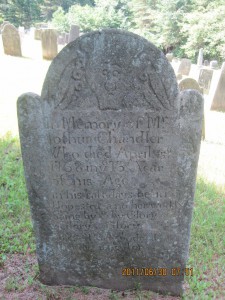
Sometimes, the most interesting stories are found when you weren’t looking for them, as in the following example. I was searching for a simple marriage record in the town of Woodstock, Connecticut. While I eventually found the record I was seeking, what I noticed immediately above that record was a series of intriguing entries. The records read as follows[1]:
1. “Chandler, Elizabeth, was requested Nov. 11, 1743 to make a public confession”
2. “Her letter of conf. was read at ch. meeting Nov. 25, 1743 and considered ‘very impertinent’” Continue reading “Very impertinent”: Elizabeth Chandler of Woodstock
